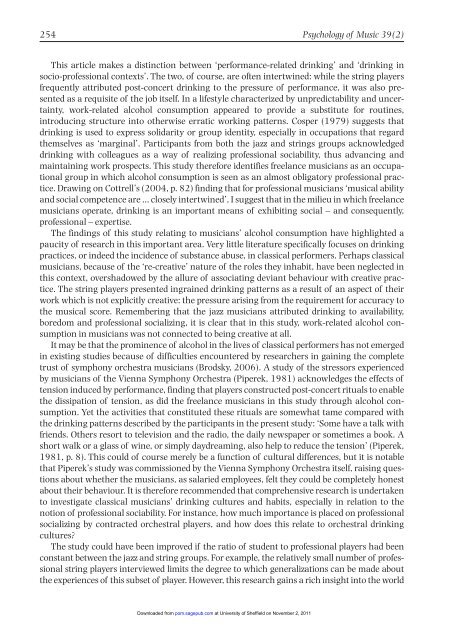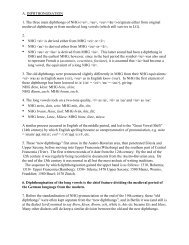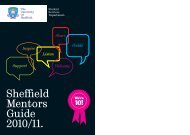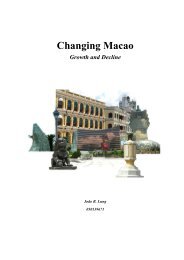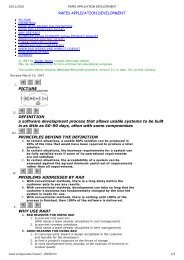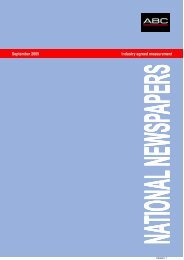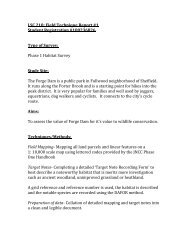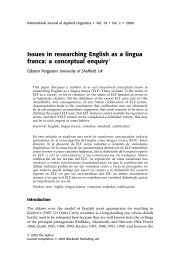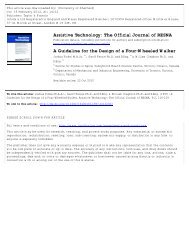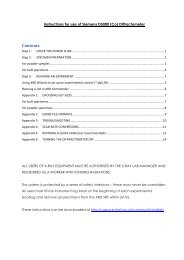Dobson, 2010.pdf - University of Sheffield
Dobson, 2010.pdf - University of Sheffield
Dobson, 2010.pdf - University of Sheffield
Create successful ePaper yourself
Turn your PDF publications into a flip-book with our unique Google optimized e-Paper software.
254 Psychology <strong>of</strong> Music 39(2)<br />
This article makes a distinction between ‘performance-related drinking’ and ‘drinking in<br />
socio-pr<strong>of</strong>essional contexts’. The two, <strong>of</strong> course, are <strong>of</strong>ten intertwined: while the string players<br />
frequently attributed post-concert drinking to the pressure <strong>of</strong> performance, it was also presented<br />
as a requisite <strong>of</strong> the job itself. In a lifestyle characterized by unpredictability and uncertainty,<br />
work-related alcohol consumption appeared to provide a substitute for routines,<br />
introducing structure into otherwise erratic working patterns. Cosper (1979) suggests that<br />
drinking is used to express solidarity or group identity, especially in occupations that regard<br />
themselves as ‘marginal’. Participants from both the jazz and strings groups acknowledged<br />
drinking with colleagues as a way <strong>of</strong> realizing pr<strong>of</strong>essional sociability, thus advancing and<br />
maintaining work prospects. This study therefore identifies freelance musicians as an occupational<br />
group in which alcohol consumption is seen as an almost obligatory pr<strong>of</strong>essional practice.<br />
Drawing on Cottrell’s (2004, p. 82) finding that for pr<strong>of</strong>essional musicians ‘musical ability<br />
and social competence are … closely intertwined’, I suggest that in the milieu in which freelance<br />
musicians operate, drinking is an important means <strong>of</strong> exhibiting social – and consequently,<br />
pr<strong>of</strong>essional – expertise.<br />
The findings <strong>of</strong> this study relating to musicians’ alcohol consumption have highlighted a<br />
paucity <strong>of</strong> research in this important area. Very little literature specifically focuses on drinking<br />
practices, or indeed the incidence <strong>of</strong> substance abuse, in classical performers. Perhaps classical<br />
musicians, because <strong>of</strong> the ‘re-creative’ nature <strong>of</strong> the roles they inhabit, have been neglected in<br />
this context, overshadowed by the allure <strong>of</strong> associating deviant behaviour with creative practice.<br />
The string players presented ingrained drinking patterns as a result <strong>of</strong> an aspect <strong>of</strong> their<br />
work which is not explicitly creative: the pressure arising from the requirement for accuracy to<br />
the musical score. Remembering that the jazz musicians attributed drinking to availability,<br />
boredom and pr<strong>of</strong>essional socializing, it is clear that in this study, work-related alcohol consumption<br />
in musicians was not connected to being creative at all.<br />
It may be that the prominence <strong>of</strong> alcohol in the lives <strong>of</strong> classical performers has not emerged<br />
in existing studies because <strong>of</strong> difficulties encountered by researchers in gaining the complete<br />
trust <strong>of</strong> symphony orchestra musicians (Brodsky, 2006). A study <strong>of</strong> the stressors experienced<br />
by musicians <strong>of</strong> the Vienna Symphony Orchestra (Piperek, 1981) acknowledges the effects <strong>of</strong><br />
tension induced by performance, finding that players constructed post-concert rituals to enable<br />
the dissipation <strong>of</strong> tension, as did the freelance musicians in this study through alcohol consumption.<br />
Yet the activities that constituted these rituals are somewhat tame compared with<br />
the drinking patterns described by the participants in the present study: ‘Some have a talk with<br />
friends. Others resort to television and the radio, the daily newspaper or sometimes a book. A<br />
short walk or a glass <strong>of</strong> wine, or simply daydreaming, also help to reduce the tension’ (Piperek,<br />
1981, p. 8). This could <strong>of</strong> course merely be a function <strong>of</strong> cultural differences, but it is notable<br />
that Piperek’s study was commissioned by the Vienna Symphony Orchestra itself, raising questions<br />
about whether the musicians, as salaried employees, felt they could be completely honest<br />
about their behaviour. It is therefore recommended that comprehensive research is undertaken<br />
to investigate classical musicians’ drinking cultures and habits, especially in relation to the<br />
notion <strong>of</strong> pr<strong>of</strong>essional sociability. For instance, how much importance is placed on pr<strong>of</strong>essional<br />
socializing by contracted orchestral players, and how does this relate to orchestral drinking<br />
cultures?<br />
The study could have been improved if the ratio <strong>of</strong> student to pr<strong>of</strong>essional players had been<br />
constant between the jazz and string groups. For example, the relatively small number <strong>of</strong> pr<strong>of</strong>essional<br />
string players interviewed limits the degree to which generalizations can be made about<br />
the experiences <strong>of</strong> this subset <strong>of</strong> player. However, this research gains a rich insight into the world<br />
Downloaded from<br />
pom.sagepub.com at <strong>University</strong> <strong>of</strong> <strong>Sheffield</strong> on November 2, 2011


